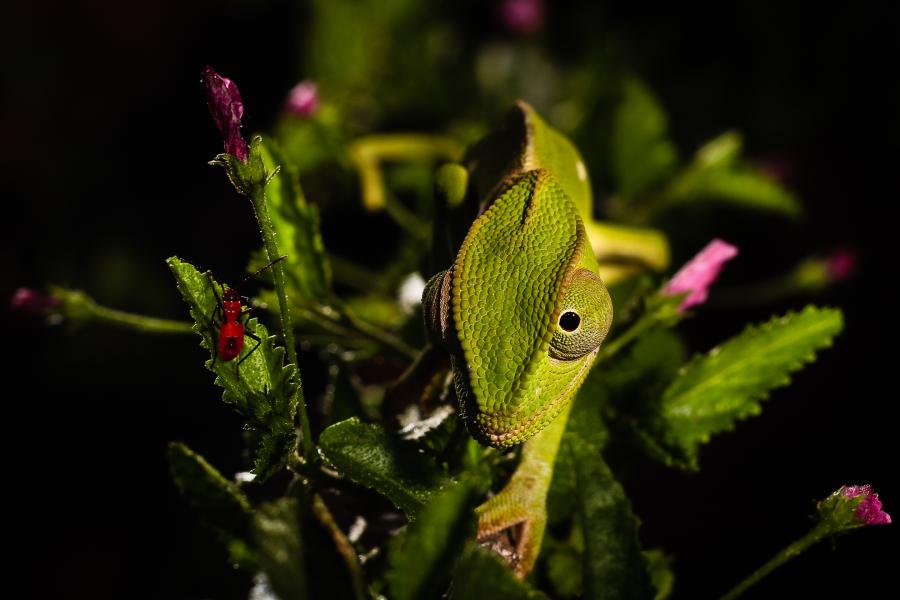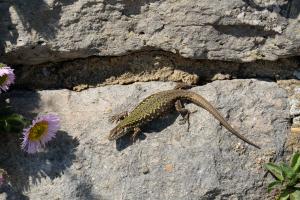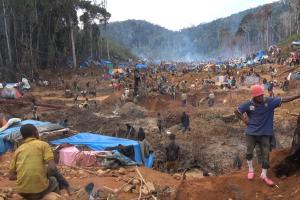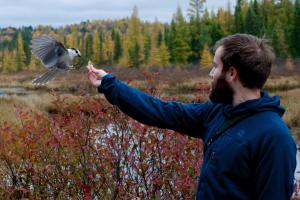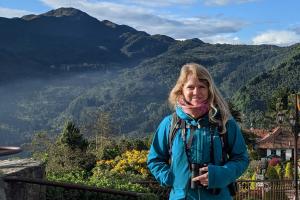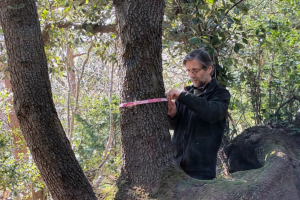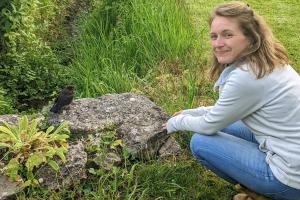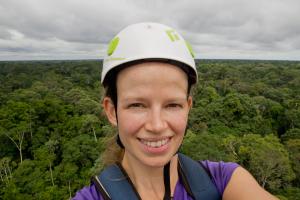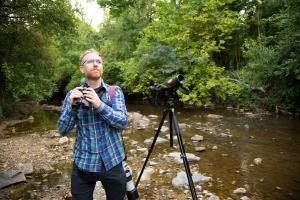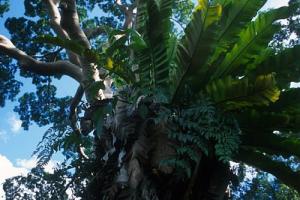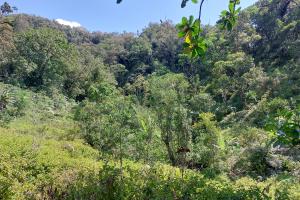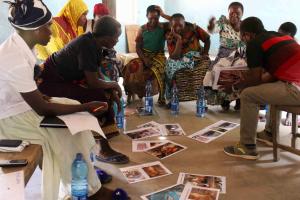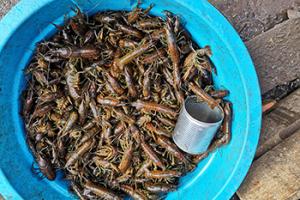Working across disciplines
Our research spans a range of taxa, from African primates to red squirrels, rare British trees to reptiles, epiphytic ferns to insect pollinators, and mangroves to reef fish.
We collect social and ecological data from locations across the globe, undertake laboratory work, and use sophisticated computer modelling to tackle questions at a range of spatial scales, from individual organisms through to global systems. Collaborating with a diversity of universities, conservation organisations, government agencies and local community groups in the UK and around the world, we work across disciplines to inform conservation practice.
Our strengths
We have particular strengths in nature-based solutions to environmental change, the intersection between biodiversity conservation, human behaviour and poverty, impacts of agriculture on biodiversity, rewilding, robust impact evaluation, conservation conflict, and the contribution of ex-situ efforts to conservation goals.
Latest news and views
See MoreFeatured researchers
Find out more about some of our researchers. A full list of staff and students can be found below.
Conservation@Bangor researchers
- Mr Robbie Blackhall-Miles (Honorary)
- Dr Caroline Bettridge
- Dr Paul Cross
- Dr Christian Dunn
- Dr Leejiah Dorward
- Dr James Hicks
- Dr Rosie Moorhouse-Gann
- Dr Sophie Wynne-Hones
- Dr Farnon Ellwood
- Dr Alexander Georgiev
- Professor John Healey
- Dr Neal Hockley
- Professor Julia Patricia Gordon Jones
- Dr Ewa Krzyszczyk
- Dr Kirsty MacLeod
- Dr Lars Markesteijn
- Dr Tom Martin
- Prof Andrew Pullin (Emeritus)
- Dr Edwin Pynegar
- Dr Craig Shuttleworth (Honorary)
- Dr Freya St John
- Dr Alex Sutton
- Professor George Turner
- Dr Simon Valle (Honorary)
- Dr Eleanor Warren-Thomas
- Professor Simon Willcock
- Dr Sophie Williams (Honorary)
Featured projects
Find out about current Conservation@Bangor projects by reading our project pages and blogs:
Conservation@Bangor projects
Our projects have global reach, using the diverse expertise of Bangor staff, research students, and collaborators.
- Conservation and Human Behaviour Research Group (CONHUB) – Understanding human behaviour and decision making in conservation contexts
- Forests 4 Climate and People
- Investing in agroforestry options for forest restoration in Indonesia
- Marrying community land rights with stakeholder aspirations in Indonesian Borneo
- Understanding unintended consequences of tropical forest restoration for people, carbon, and biodiversity (Fellowship project)
Our research around the world
Opportunities

Conservation@Bangor researchers supervise PhD researchers through the Envision Doctoral Training Partnership, funded by the Natural Environment Research Council (NERC).
If you are interested in completing postgraduate research (MRes or PhD) with Conservation@Bangor, whether through Envision or an alternative route, please contact individual staff members to discuss.
Recent publications
A selection of recent publications from Conservation@Bangor researchers is listed here, but for all the latest publications, please check individual researcher pages linked above.
- Widespread extinctions of co-diversified primate gut bacterial symbionts from humans. Sanders, J.G., Sprockett, D.D., Li, Y., Mjungu, D., Lonsdorf, E.V., Ndjango, J.B.N., Georgiev, A.V., Hart, J.A., Sanz, C.M., Morgan, D.B. and Peeters, M., 2023. Nature Microbiology, pp.1-12. https://doi.org/10.1038/s41564-023-01388-w
- Topic sensitivity still affects honest responding, even when specialized questioning techniques are used. Ibbett, H., Dorward, L.J., Kohi, E.M., Jones, J.P., Sankeni, S., Kaduma, J., Mchomvu, J., Mawenya, R. and St. John, F.A., 2023.Conservation Science and Practice, p.e12927. https://doi.org/10.1111/csp2.12927
- Resolving Land Tenure Security Is Essential to Deliver Forest Restoration. Rakotonarivo, O.S., Rakotoarisoa, M., Rajaonarivelo, H.M., Raharijaona, S., Jones, J.P.G., and Hockley, N. 2023.Communications Earth & Environment 4, no. 1, 179. https://doi.org/10.1038/s43247-023-00847-w.
- Introducing a common taxonomy to support learning from failure in conservation. Dickson, I., Butchart, S.H., Catalano, A., Gibbons, D., Jones, J.P., Lee‐Brooks, K., Oldfield, T., Noble, D., Paterson, S., Roy, S. and Semelin, J., 2023. Conservation Biology, 37(1), p.e13967. https://doi.org/10.1111/cobi.13967
- Credit credibility threatens forests. Balmford, A., Brancalion, P.H., Coomes, D., Filewod, B., Groom, B., Guizar-Couti ño, A., Jones, J.P., Keshav, S., Kontoleon, A., Madhavapeddy, A. and Malhi, Y., 2023. Science, 380(6644), pp.466-467. https://doi.org/10.1126/science.adh3426
- Towards a standardized framework for managing lost species. Martin, T.E., Bennett, G.C., Fairbairn, A. and Mooers, A.O., 2023. Animal Conservation, 26(1), pp.29-30. https://doi.org/10.1111/acv.12865
- Applied winter biology: Threats, conservation and management of biological resources during winter in cold climate regions. Reeve, C., Robichaud, J. A., Fernandes, T., Bates, A. E., Bramburger, A. J., Brownscombe, J. W., Davy, C. M., Henry, H. A. L., McMeans, B. C., Moise, E. R. D., Sharma, S., Smith, P. A., Studd, E. K., O’Sullivan, A., Sutton, A. O., Templer, P. H., & Cooke, S. J. 2023. Conservation Physiology, 11(1), coad027. https://doi.org/10.1093/conphys/coad027
- Impacts of herbivory by ecological replacements on an island ecosystem. JMoorhouse‐Gann, R.J., Vaughan, I.P., Cole, N.C., Goder, M., Tatayah, V., Jones, C.G., Mike, D., Young, R.P., Bruford, M.W., Rivers, M.C. and Hipperson, H., 2022. ournal of Applied Ecology, 59(9), pp.2245-2261. https://doi.org/10.1111/1365-2664.14096
- Rewilding—The farmers’ perspective. Perceptions and attitudinal support for rewilding among the English farming community. Mikołajczak, K.M., Jones, N., Sandom, C.J., Wynne‐Jones, S., Beardsall, A., Burgelman, S., Ellam, L. and Wheeler, H.C., 2022. People and Nature, 4(6), pp.1435-1449. https://doi.org/10.1002/pan3.10376
- Impact of landscape configuration and composition on pollinator communities across different European biogeographic regions. Bottero, I., Dominik, C., Schweiger, O., Albrecht, M., Attridge, E., Brown, M.J.F., Cini, E., Costa, C., De la Rúa, P., de Miranda, J.R., Di Prisco, G., Dzul Uuh, D., Hodge, S., Ivarsson, K., Knauer, A.C., Klein, A.-M., Mänd, M., Martínez-López, V., Medrzycki, P., Pereira-Peixoto, H., Potts, S., Raimets, R., Rundlöf, M., Schwarz, J.M., Senapathi, D., Tamburini, G., Talaván, E.T., Stout, J.C., 2023. Frontiers in Ecology and Evolution 11. https://doi.org/10.3389/fevo.2023.1128228
- Small effects of family size on sociality despite strong kin preferences in female bottlenose dolphins. Foroughirad, V., Frère, C.H., Levengood, A.L., Kopps, A.M., Krzyszczyk, E. and Mann, J., 2023. Animal Behaviour, 195, pp.53-66. https://doi.org/10.1016/j.anbehav.2022.10.011
- Model ensembles of ecosystem services fill global certainty and capacity gaps. Willcock, S., Hooftman, D.A., Neugarten, R.A., Chaplin-Kramer, R., Barredo, J.I., Hickler, T., Kindermann, G., Lewis, A.R., Lindeskog, M., Martínez-López, J. and Bullock, J.M., 2023. Science Advances, 9(14), p.eadf5492. https://doi.org/10.1126/sciadv.adf5492
- Differential effects of vegetation and climate on termite diversity and damage. Wu, D., Seibold, S., Ellwood, M.F. and Chu, C., 2022. Journal of Applied Ecology, 59(12), pp.2922-2935. https://doi-org.bangor.idm.oclc.org/10.1111/1365-2664.14282
- The effects of population management on wild ungulates: A systematic map of evidence for UK species. Barton, O., Gresham, A., Healey, J.R., Cordes, L.S. and Shannon, G., 2022. Plos one, 17(6), p.e0267385. https://doi.org/10.1371/journal.pone.0267385
- Gas compressor noise does not influence tree swallow nestling condition or immune response. JMacLeod, K.J., Naugle, L., Brittingham, M.C. and Avery, J.D., 2022. ournal of Zoology, 318(1), pp.1-9. https://doi.org/10.1111/jzo.12997
- Widespread variation in functional trait–vital rate relationships in tropical tree seedlings across a precipitation and soil phosphorus gradient. Browne, L., Markesteijn, L., Manzané‐Pinzón, E., Wright, S.J., Bagchi, R., Engelbrecht, B.M., Jones, F.A. and Comita, L.S., 2023. Functional Ecology, 37(2), pp.248-260. https://doi.org/10.1111/1365-2435.1421
- On track to achieve no net loss of forest at Madagascar’s biggest mine. Devenish, K., Desbureaux, S., Willcock, S., & Jones, J. P. G. (2022). Nature Sustainability, 5(6), 498–508. https://doi.org/10.1038/s41893-022-00850-7

